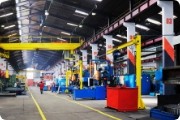Material Issues and SDGs
At the Fuji Electric E&C (“FEEC”) Group, we have identified eight material issues that we must act on as matters of priority. These material issues will enable us to contribute to the achievement of the SDGs and solve other social challenges through our businesses, as well as achieve medium-to long-term growth.
Environment
-
- Reduction of greenhouse gas emissions
- Strengthening of renewable energy initiatives
- Contribution to a recycling-oriented society
Social
-
- Promotion of occupational safety and health, Improvement of construction quality
- Encouragement of health and productivity management (Promotion of work-life balance)
- Ensuring and training diverse human resources
- Development of responsible supply chain management
Governance
-
- Strengthening of corporate governance
Main SDGs Relating to the FEEC Group’s Businesses
Through our business activities, we are working to contribute to the achievement of the SDGs, a set of goals that aims to reduce environmental impact and narrow economic disparities, for example, and ultimately achieve a sustainable society.
Process for Identifying Material Issues
In line with social challenges in Japan and overseas, their relevance to society (and our stakeholders) and their impact on our management, using Steps 1 to 4 below we have identified eight material issues for us to address.

- While referring to the SDGs, the GRI (Global Reporting Initiative) Standards, and other international frameworks, we pinpointed 104 social challenges in Japan and overseas.
- We examined and confirmed the positive and negative impacts that our corporate activities have on the SDGs.
- We then assessed their level of importance based on two factors: Their relevance to society (and our stakeholders) and their impact on FEEC.
- At a workshop attended by officers and department representatives, we exchanged opinions and discussed their level of priority, the initiatives required to address them, and the link between the SDGs and FEEC businesses.
- Following discussions by the Sustainability Committee and the Board of Directors, we settled on eight material issues that must be addressed as matters of priority, specific initiatives, and KPIs.
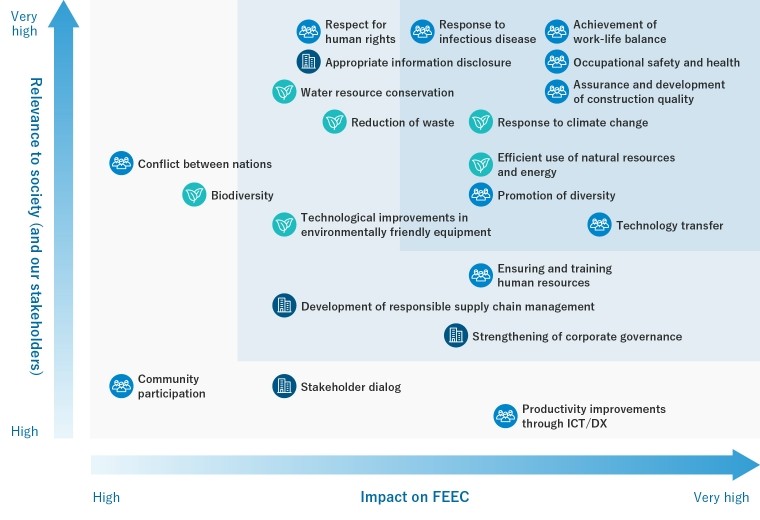
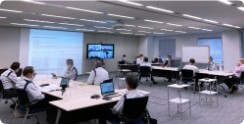
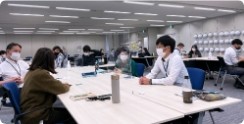
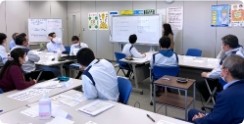
Material Issues and KPIs
By formulating and promoting specific initiatives and working toward KPIs to achieve the material issues, we will aim to create both social and economic value through our business activities.
 Environment
Environment
| Material issues | Specific initiatives | KPIs | FY2030 targets | Relevant SDGs |
|---|---|---|---|---|
| Reduction of greenhouse gas emissions | Promotion of decarbonization across all businesses | CO2 emissions reduction rate | -30% |
|
| Reinforcement of proposals for equipment systems with outstanding energy efficiency | No. of proposals | 400% (compared to FY2019) |
||
| Reduction in CO2 emissions as a result of proposals | 250% (compared to FY2019) |
|||
| Promotion of energy efficient offices | Reduction in office energy consumption | -30% | ||
| Promotion of environmentally friendly green procuremen | Reinforcement of green procurement for priority items* | ー | ||
| Switch to electric lease vehicles | Rate of electric vehicles among all lease vehicles | 100% | ||
| Strengthening of renewable energy initiatives | Reinforcement of response to renewable energy market in line with market changes | Solar power generation: Focus on PPA, reinforcement of response to PPA projects | ー | |
| Wind power generation: Reinforcement of response to negotiations for transformers and private power lines | ||||
| Contribution to a recycling-oriented society | Thorough waste management at construction sites | Reinforcement of industrial waste management | ー | |
| Promotion of recycling through reduction of mixed waste | Reduction in percentage of mixed waste | -20% |
*Priority items are eco-cables, LED lighting, air conditioners, and transformers.
 Social
Social
| Material issues | Specific initiatives | KPIs | FY2030 targets | Relevant SDGs |
|---|---|---|---|---|
| Promotion of occupational safety and health , Improvement of construction quality | Prevention of occupational accidents through thorough management systems | No. of serious accidents | 0 |
|
| Improvement of construction quality through ICT/DX | Reduction of quality defect rate (percentage of physical accidents/complaints) | -30% | ||
| Encouragement of health and productivity management (Promotion of work-life balance) | Reduction of long working hours | Rate of implementation of five-day work weeks at construction sites | 100% | |
| Promotion of work-life balance | Average no. of days of paid leave taken | 13 days | ||
| Rate of male employees taking childcare leave | 100% | |||
| Ensuring and training diverse human resources | Promotion of diversity | Introduction of systems to support diverse human resources and diverse workstyles | ー | |
| Percentage of female engineers | 10% | |||
| Percentage of female managers | 9% | |||
| Development of responsible supply chain management | Promotion of awareness and use of CSR procurement guidelines | Rate of guideline understanding and agreement | 100% |
 Governance
Governance
| Material issues | Specific initiatives | KPIs | FY2030 targets | Relevant SDGs |
|---|---|---|---|---|
| Strengthening of corporate governance | Thorough compliance | No. of serious legal violations | 0 |
|
| No. of compliance training sessions | More than 4 times a year | |||
| Reinforcement of risk management | Rate of implementation of risk assessments for matters involving serious business risks | 100% | ||
| Reinforcement of information security | No. of serious information security accidents | 0 | ||
| Stakeholder dialog (reinforcement of engagement) | Acquisition of opportunities for stakeholder dialog | More than 4 times a year |






